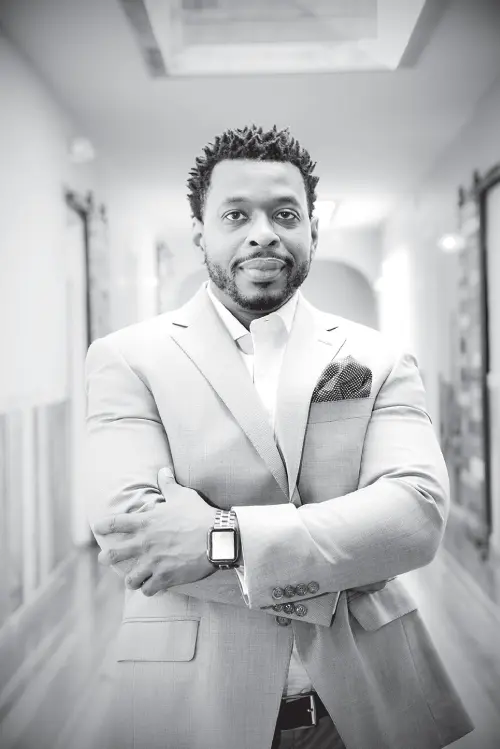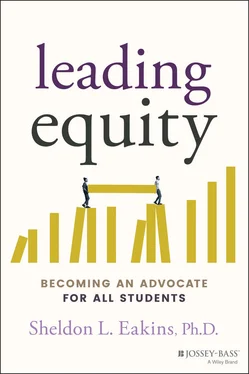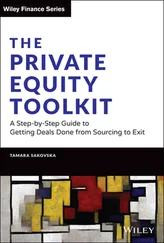My final question to you is, “What are you?”
The idea of writing a book was a dream of mine, and the opportunity to publish this book came right at a time when I was dealing with personal challenges in my life. I could not have accomplished this goal without the support and prayers from Dr. Sawsan Jaber, Dr. LaWanda Wesley, Dr. Josue Falaise, Dr. Naima Duncan, Mr. Joe Truss, Ms. Mona Elleithee, Ms. Sandra Clough, Dr. Yolanda Sealey-Ruiz, and Mr. Alex Horton. You are all influential people in my life. Thank you for allowing me to be vulnerable with you and lifting my spirits.
To my Leading Equity Center team, Sara Price, Popsy Kanagaratnam, Darlene Reyes, and Margaret Harris-Shoates, thank you for believing in me and Leading Equity. Sara, I can't thank you enough for helping me stay organized and editing my transcripts. Popsy, you have been with me since the very beginning, and your work with the Weekend Voice is priceless. Margaret, you are one of the most creative individuals I know. Thank you for all of the resources that you have designed for me. Darlene, you have done a phenomenal job working with our student affinity groups. I know that you will continue to do great things. Without the support of the Leading Equity Center (LEC) team, this book would not have been written. Thank you all for your roles in supporting this work and easing my writing stress while maintaining the LEC.
Furthermore, I would like to thank the students and staff at the Shoshone-Bannock Jr./Sr. High School. I learned so much from my time working with you. Thank you for embracing me and making me feel like a member of your community. The generosity and fellowship humble me. I truly believe the motto “We are a small school…but a big family.”
I would be remiss if I did not mention Ms. Jenny Magiera and the rest of the OVA family for the continued support of the Leading Equity Center. My experience in Chicago helped me develop the storytelling skills that have allowed me to confidently speak on stage and ultimately share my stories throughout this book.
I am thankful for the conversations I have had with Principal Kafele, Ken Shelton, Dee Lanier, Ron Madison, Jeff Gargas, and Jorge Valenzuela. I consider all of you as brothers and appreciate your perspectives of education that have inspired many of my thoughts for this book.
Writing is not my favorite thing, as I tend to write as I talk. It's often hard for me to translate my thoughts into readable content. That's why I always say that I podcast for a reason. I want to thank Tom Dinse for your honest feedback and editing of this book. I also thank Dr. Joel Boyce for your editing services.
To Amy Fandrei and the rest of the Jossey-Bass/Wiley team, thank you for believing in this work.
Finally, I want to thank my family. To my parents, Dr. Lewis Eakins and Ms. Denese Eakins. Thank you for your faith, prayers, and guidance. To my sister, Colleen, and my brother, Justin, thank you for being the best siblings anyone could ask for. To my two children, Laila and Sheldon Jr., thank you for never complaining when I had to write, for your patience, and for being the most amazing kids. Daddy loves you.

Sheldon L. Eakins, PhD, is the founder of the Leading Equity Center and host of the Leading Equity Podcast. With more than a decade in education, he has served as a teacher, principal, adjunct professor, and director of special education.
Dr. Eakins has a passion for helping educators accomplish equitable practices in their schools. He has earned a BS degree in social science education, an MS degree in educational leadership, and a PhD in K-12 education.
CHAPTER 1 Know Your Biases and Recognize Your Position of Privilege as an Educator
This chapter discusses how our biases and privilege may impact our decisions in an unconscious manner. I'll begin with sharing my experience of realizing how my excitement in my personal life illuminated a few of my privileges. Sometimes, when we hear the word privilege , we default to the popular term white privilege . The reality is, though, we all have some form of privilege. I will move into discussing ways that we can assess our biases and privilege, build relationships, and ultimately address others when we witness bias at school.
I remember sharing with a group of my students about a cruise I was on a few years ago. “Oh man,” I told them, “I went on a cruise with my kids during the winter break, and we had so much fun, and these are all the things that we did. I took my kids here, and we did this, and we did that. We went on this excursion.” As I was talking to my students, one of them raised their hand and said, “Dr. Eakins, I've never even been on a boat.” Another student said, “I've never even left the reservation.” A third student said, “Well, that sounds really cool.” I could see on their faces that my privilege was showing. I realized that I needed to dial it back a little bit.
It's not that I can't share an experience with a student, but rather, it's essential to recognize that some of my students haven't had or will never have similar experiences.
On the other hand, we can't avoid those conversations completely as teachers. How can we frame them? We can try to say it in a way that motivates students to think, “You know what? Maybe I should get my college degree. Maybe I should become a teacher. I'm encouraged because look, my teacher, someone I respect, has shared about some of the experiences that he had. Those are some experiences that I would like to have too. How do I get there?”
I believe that when it comes to how we approach education, we must start to recognize how our beliefs impact the decisions we make. The conversations we have in class and the content we choose to show our students often are influenced by how we view the world.
Consider where you grew up and what your family dynamics are. How diverse was the population and area where you were raised? If you can answer, “Well, I grew up in a very diverse community,” my next question is, “How diverse was your social circle?” Although you may have grown up in a town that had many cultures, races, and ethnicities, that doesn't mean that you were immersed in cultures other than your own.
Assessing Your Affinity Bias
Whenever I conduct a training on bias, I like to do an activity with the audience. Let's try this! Grab a pen and paper and list at least six people you trust. These should be nonfamily members, so they can't be your brother or sister, mom, and dad. This activity is a lot better when you have more people, so if you can list more than six people, that is even better.
Your definition of trust might be, “If I give this person $5, I trust that they will give me my money back.” It might be that you'd trust this person to babysit your children.
Next, put a check next to everyone who is the same race as you. Then I want you to put a check next to everyone who is the same gender as you. Ditto for religion—not denominational religion like Baptist or Lutheran or whatever, but if you're both Christian or atheist or Jewish or Hindu or Sikh or Muslim. Next, I want you to put a check next to everyone who is similar in age. Now, put a check next to everyone who shares your political views. Finally, I want you to put a check next to anyone who shares the same sexual preference as you.
Now, I want you to look at your list. Do you have a lot of checks?
Читать дальше













